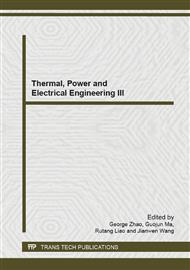p.1183
p.1189
p.1194
p.1198
p.1203
p.1207
p.1214
p.1225
p.1230
Simulation of the Speed-Sensorless Vector Control System Based on MRAS
Abstract:
Aimed at the problem of speed identification for the asynthetic motor speed-less sensor vector control system, based on basic equations of vector control and centered by the current model and voltage model of rotor flux linkage, after the establishment of the rotor speed identification module by module reference self-adaptation theory (MRAS), this paper builds the MRAS speed-less sensor vector control system and establishes the system simulation model in Simulink software environment. Simulation results show that: the system has good dynamic and static characteristics and stability. Key words: speed-less sensor; vector control; MRAS; simulation CLC: TM343.2 Document Code:A
Info:
Periodical:
Pages:
1203-1206
Citation:
Online since:
June 2014
Authors:
Keywords:
Price:
Сopyright:
© 2014 Trans Tech Publications Ltd. All Rights Reserved
Share:
Citation:


